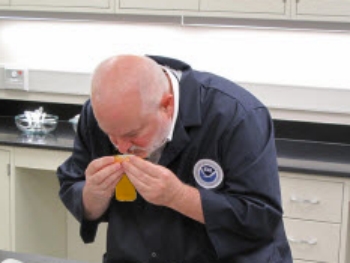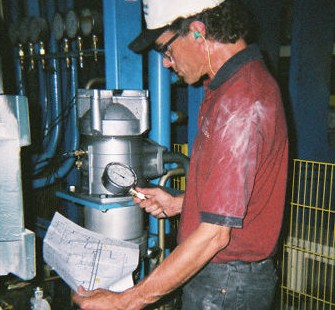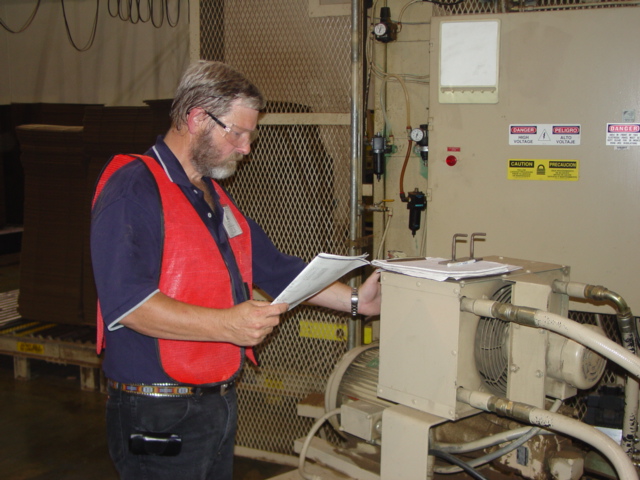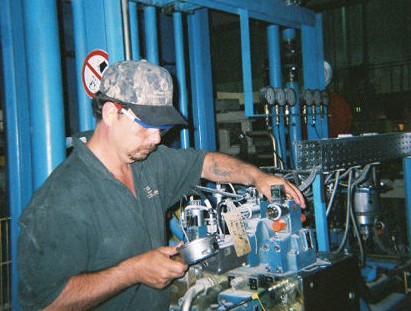
P.O. Box 1376
Monroe, GA 30655
(770) 267-3787
gpm@gpmhydraulic.com
 |
 |
 |
 |
 |
 |
January 2014
For an archive of past newsletters, please visit:
http://www.GPMHydraulic.com/newsletter_archive/
"Troubleshooting Hydraulics" Newsletter
www.gpmhydraulic.com
1. When There is No Time for an Oil Analysis
2. Call GPM For Emergency Troubleshooting
3. Our NEW Accumulator Safety DVD
4. Is It Time For A Hydraulic Reliability Assessment At Your Plant?
5. Parts Changer or Troubleshooter? Take the Quiz!
6. 2014 Hands-On Public Reliability & Troubleshooting Workshops
There is no question that the most effective single practice you can take to ensure machine reliability is regular oil sampling and analysis. Most of the time, when I am called to help diagnose a hydraulic problem, one of the first things I will have the customer do is take an oil sample and send it to the lab for analysis. Well, that's great, but if no field tests are made, we have no idea whether the condition of the oil is contributing to the outage until lab results are obtained. Production can't be simply halted until lab results are returned. We need some idea of the oil condition right now - not whenever we can get lab results. Fortunately, a few oil conditions can be determined - or at least estimated - using our senses.
Contaminants large enough to damage a hydraulic machine are microscopic. We can't just look at the oil and know with any level of certainty whether it is contaminated. Naturally, if we can see visible particles, that confirms that the oil is contaminated. But even badly contaminated oil will often look just fine. The smallest particle we can see is about 40 microns. Most hydraulic machines require oil to be filtered to somewhere between 5 and 10 microns. But while we can only see particles 40 microns and larger, we can feel particles much smaller than that. Be sure your hands are clean. And be sure you have a representative sample of oil. Rubbing some oil between our fingers, many of us can feel particles as small as 15 - 20 microns. Now, granted if we don't feel anything in the oil, that doesn't mean it is contaminated. But if we have a "gritty" feel between our fingers, it's a pretty good bet that there is particulate in the oil. We can be certain that the oil needs to be flushed.
Our sense of smell is a very direct sense. In order to smell anything, physical matter must get into our nose. This may be a little unsettling to realize, given some of the foul smells we encounter in our life, but it is true. If you smell anything in that oil, something is emanating from it. In the lab, this is call gas chromatography. These are tests made, not of what is in the oil, but of what is emanating from it. If you smell your oil, you are performing a very crude version of gas chromatography. So, what does it smell like? If you have never done this, it would be a good idea to first smell some new oil so you have an idea of how it should smell. Then compare it to the oil in the machine.

Does the oil have a pungent odor like that of rotten eggs? This is a classic symptom of oxidation. If this is the case, the oil has been permanently chemically altered. Oxidized oil will do damage to the machine. The oil becomes acidic and corrosion occurs. The machine gradually gets destroyed from the inside out. Don't wait for an oil analysis - change the oil.
Does the oil smell like a dead animal on the side of the road? There is bacterial contamination. This is rare on most hydraulic machines because the oil temperature is often above 130o F and bacteria cannot live at temperatures that high. But not all machines operate at such temperatures and bacteria can set in, clogging control systems, degrading the oil quality and generate corrosive chemicals. The good news is that bacterial contamination can be flushed from the oil. You must find the source of the bacteria or it will return.
Does the oil smell like black toast? This is thermal breakdown of the oil. Again, a chemical change has occurred. The oil must be replaced, but not before determining the root cause, otherwise the new oil will do the same thing. Cavitation and aeration of the pump and of actuators are common causes of thermal breakdown of the oil.
What about taste? OK, I'm not recommending that you drink your hydraulic oil. Or even taste it. In fact, it probably isn't a good idea. But if despite my warnings to the contrary you are brave enough to try it, I have been able to detect problems by touching a drop of oil to my tongue. Brass and iron have distinctive tastes. An excessive amount of brass in the oil is a good indication of a badly worn piston pump. The weak point of a piston pump is the brass connectors between the pistons and the swash plate. Iron is indicative of valve or cylinder wear. Only smokers can taste copper in the oil. If smoke makes a drop of oil taste sweet, copper is present. This is suggestive of worn bushings or a heat exchanger with copper tubing that has failed or is about to fail.None of this is a substitute for a laboratory oil analysis. Before we dismiss the oil as a possible cause of a failure, by all means wait for a lab analysis. But when the machine is down and components need to be changed to restore production, the characteristics of the oil can often tell you if it would be a good idea to replace or flush the oil before returning to service.

 |  |  |
Nothing is more expensive than unscheduled down time. GPMs customers know they can call whenever they have a troubleshooting issue they simply cant resolve. With over 75 years' experience dealing with hydraulic failures, our consultants have the resources to help troubleshoot whatever hydraulic problem you encounter. Whether youre experiencing a total system outage, repeated component failure or need a professionally designed hydraulic reliability assessment, the consultants at GPM can help. Call GPM for:
- In-plant Troubleshooting
- Leakage Problems
- Pressure Settings
- Shock Problems
- Hydraulic Reliability Assessments
- Hydraulic Troubleshooting Manual Development
- Startup Consulting and Recommendations
- Heat Problems
- Repeated Component Failures
- Speed Problems
Do you want to learn more about how GPM can help you? Go to http://gpmhydraulic.com/troubleshooting.php.
Ingredients 1/2 cup butter (NOT margarine!) Melt butter and olive oil, add onions and stir until you can start to see through them - do not brown. Add beef broth, sherry and thyme. Salt and pepper to taste, simmer for 30 minutes. Ladle into oven safe serving bowls, place one slice of bread on top of each. Layer each with provolone, swiss and 1 tablespoon of parmesan. Broil until cheese bubbles and starts to brown. |